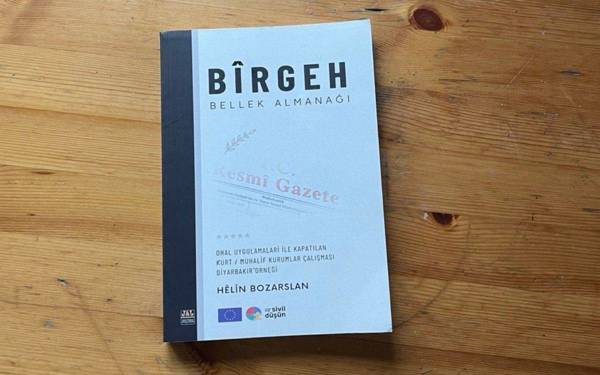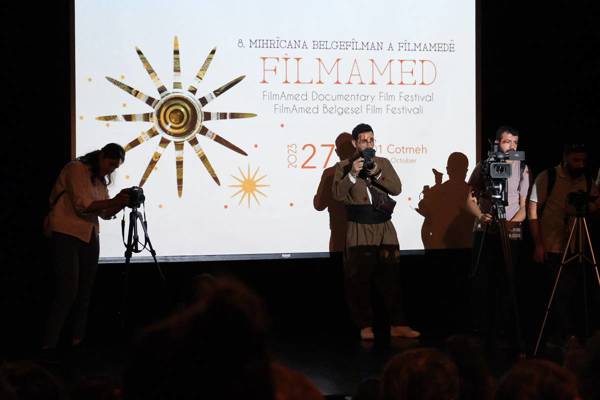Click to read the article in Kurdish / Turkish
In March, a video featuring Egyptian musician Hamza Namira and a group of his friends while singing a song in one of the most well-known squares of Ireland quickly spread on digital platforms, especially on YouTube.
In that video, Namira was singing one of the most famous strans, or songs, of Kurdish, namely "Ez Kevok im" or, to put in in English, "I am a pigeon."
Their video also showed that the ones listening to the song in the square as well as the passers-by were trying to sing along or beating time.
The video quickly spread on social media.
One of the most frequently sung Kurdish songs
Since the second half of 1900s, "Ez Kevok im" has been one of the most frequently performed songs of Kurdish. In fact, it was not only sung by Kurdish musicians but also by several others from other countries.
As the song was also played on the Kurdish section of Radio Baghdad, it has made it more popular, especially in the Arabian peninsula.
Performed by several Kurdish bands and musicians such as Aynur Doğan, Kamkaran and Şehram Nazerî on a number of international platforms, the song is now also more popular in the world.
As for the source of this song, or rather, the person known to have sung it for the first time, Hesen Cizrawî, or Hesen Cizîrî, seems to be the source.
Born in the district of Cizre in Turkey's Kurdish majority Şırnak province in 1917, Cizrawî lost his life in Zaho in the Iraqi Kurdistan Region. For years, he sang songs for the Kurdish section of Radio Baghdad.
It is sung in different dialects of Kurdish
After Cizrawî, dozens of musicians have performed this song in the Kurmanji, Soranî and Hewramî dialects of Kurdish.
When he first sang this song, Hesen Cizrawî could have not possibly known that this song would become so popular. But after him, several others from different parts of the world, especially Arabic musicians, have sung it. Hamza Namira, the Egyptian musician in Ireland, was an example.
Some of the Kurdish musicians who have sung it so far are Mihemed Arif Cizrawî, Hesen Zîrek, Mamlê, Kamkaran, Dilşad Saîd, Şehram Nazerî and Aynur Doğan among many others.
It was also sung in Turkish
The song "Ez Kevok im" is also known in Turkish. However, like several other Kurdish songs that have come to be sung in Turkish, it has long been known and performed with the name of "Hele yar zalim yar."
"Translated" into Turkish by İ. Celal Güzelses, "Hele yar zalim yar" has been so far performed by several musicians, including Celal Güzelses as well as İbrahim Tatlıses, Zekeriya Ünlü and İzzet Altınmeşe.
"Ez Kevok im" is now orally and instrumentally performed in several different music genres from jazz to pop.
According to music researcher Zeynep Yaş, who has spoken to bianet, the song is possibly not a composition by Hesen Cizrawî, but a folk song.
Yaş says that she has come to this conclusion considering that it is sung in several different dialects of Kurdish and with several variations.
Let's take a look at who have sung the song so far:
1- Hesen Cizrawî
2- M. Arif Cizrawî
3- Ezîz Şarox
4- Hesen Zîrek
5- Mamlê
6- Morteza
7- Kamkaran
8- Şehram Nazerî
9- Dilşad Saîd
10- Ilana Eliya
11- Karapetê Xaço
12- Abrahamê Karapêt
13-Hovhannes Gapo
14-Endiryos Bakurî
15-Mihemed Şêxo
16-Dengbêj (Kimin söylediği bilinmiyor)
17-Hesen Şerîf ve Ardewan Zaxoyî
18-Dana Abdulcebar
19-Muhammed Riza Ahmedian
20- Dîwan Saz
21-Ardeşîr Kamkar / Zakaria Yousefi
22-Munir / Omar Bashir
23-Şehrîbana Kurdî
24-Parham Haghighi feat Mehdi Baheri
24-Kardeş Türküler / Aynûr Dogan
25-Sepideh
26-Pervîn Çakar
27-Huseyîn Zahawî
28-Babak Radmanash
29-Golbang
30-Leila Forouhar
31-Ahoura
32-DJ Gokhan Bozkurt feat Zafrir Ifrach (dup mix)
https://www.youtube.com/watch?v=I3mj2bABr-0
33-Amir Alkofi (Arab idol programı)
https://www.youtube.com/watch?v=gLYI87B0UZw
34-Hamza Namira
https://www.youtube.com/watch?v=hhR97tV6_cA
35-The concert of Arqavaneh Ensemble in St.petersburg (Russia.2017)
https://www.youtube.com/watch?v=sWkxDgMMs3U
36-Zafîre
https://www.youtube.com/watch?v=v0BUKDCXWz4
37-Rusan Filiztek / François Aria
https://www.youtube.com/watch?v=VfEWihMpEg8
38-Sana Barjanjî
https://www.youtube.com/watch?v=N2nffClxZf4
39-Lamia Jamel
https://www.youtube.com/watch?v=dANrYkM1nSY
40-Gerdûnî
https://www.youtube.com/watch?v=J3ndgoCY9D4
41-Mûrad ve Fatma
https://www.youtube.com/watch?v=AtSgn7n2UaU
42-Nupelda
https://www.youtube.com/watch?v=n3oicffIRxw
43- Hesen Kanjo
https://www.youtube.com/watch?v=T2f3ahLqbrM
44-Kavparsaz
https://www.youtube.com/watch?v=3RXMh8Ccv7Q
45-Yusuf Roman
https://www.youtube.com/watch?v=T_BkQqlQsHw
46-Gani Mirzo
47-Heyamo & ANGELS. Amsterdam vocal group.
https://www.youtube.com/watch?v=uLo2YWPj_4s
48-Erdem Altinses
https://www.youtube.com/watch?v=Iwf3GjKqQdQ
49-Roni Aran & Negar Ezazi
https://www.youtube.com/watch?v=XRuvJv919mA
50-Emîn Erbanî
https://www.youtube.com/watch?v=CPPYb00QZkQ
51-Bedrettin Çoşkun
https://www.youtube.com/watch?v=jg_Ys2Q-7p0
52-Raschid Moussa
https://www.youtube.com/watch?v=_Q_jeGwhtmM
53-Brusk Zanganeh and Sergio Escalera
https://www.youtube.com/watch?v=9EWzNcxzZls
54-Burning Jazz Kurdish Music
55-Jaanan Ensemble
https://www.youtube.com/watch?v=_rn14hl-Zdw
56-Salih Dalgın
https://www.youtube.com/watch?v=0N-d8yAF5G8
57-Bruzk Azad
https://www.youtube.com/watch?v=GOYTuQznOJ4
58-Kadir Yılmaz
https://www.youtube.com/watch?v=AdR1FBOu4vw
59-Abdulkerîm Hezexî
https://www.youtube.com/watch?v=yRElX0BDToU
60-Hozan Efsan
https://www.youtube.com/watch?v=7v0lhkgWCik
61-Mehmud Osman
https://www.youtube.com/watch?v=S5c3NhbuPl4
62-Young Kurdish
https://www.youtube.com/watch?v=DuNIWkQuS_w
63-Mateos Tsahoridisi
https://www.youtube.com/watch?v=8Y6DJV62-8Q
64-Komiko Okomira
https://www.youtube.com/watch?v=L9nPT5W7mL8
65-Orquesta Etno Cáhuil
66-Muhammed Riza Mîr Huseyn / Mujgan Marûfî
https://www.youtube.com/watch?v=BVGNL9mOguE
67-M. Arif Cizrawî/ Îsa Berwarî
https://www.youtube.com/watch?v=gnrMyT5koNM
68- Ahura Ritim Topluluğu
https://www.youtube.com/watch?v=42yWFye9gAc
69- Bijan Kamkar
(FD/SD)





.jpg)





